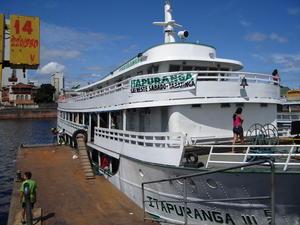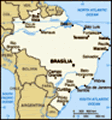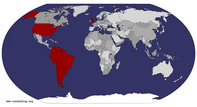Advertisement
Published: April 1st 2006

 boa1
boa1
The boat with Tas outside our cabinThe purpose of the boat trip to Tabatinga was two-fold:
1. To sail down the Amazon (Something I could only have dreamed about as a child)
2. To get to Tabatinga on the Peruvian/Columbian/Brazilian border in order to go west.
We got a taxi to the docks then a boat to our boat (?) It was in the process of being loaded with goods to the lower deck, goods which we had to fight through with our heavy bag of provisions (ours including bananas and 18 litres of water) to the get to the next deck. We were shown to our cabin at the front of the ship, not the height of luxury, quite compact at 180x180x200cm high, it did have a double bed, air conditioning and private bathroom with shower however. We dropped our bags in the space available and went off to explore the boat.
At the rear of the middle deck (the one our cabin was situated on) was the dining area and between the two in a space about 7m by 15m was where 120 people slept - hanging like bats in their hammocks, it looked very crowded. Below the hammocks, covering the

 boa3
boa3
Goodbye Manausfloor, were the possessions of the hammock dwellers. The hammocks contained young and old, men and women, some gringo travellers and many Brazilians. All of these people had paid $125 or 75 pounds to travel up to 6 days up river. I was so glad that we had decided to pay for a cabin, twice the price but at 140 pounds for 6 days sailing up the Amazon (meals included) it was a bargain. There were 6 cabins in total, all but ours housing Braziliains travelling with their goods for trade which we had just fought our way passed on the lower deck as we boarded. The boat was a standard river ferry like any other that crosses most rivers in the UK, the main difference being the lower deck was packed with cargo and the top deck was a bar and recreational area with TV.
We sat in the bar area while waiting for the boat to cast off. Other docked boats were being loaded too, all the loading being done by hand. One boat moored and two boys were hastily ordered to clean it with brushes and a bucket of soapy water. They went around it quick

 boa7
boa7
Our compact cabintime, dipping their bodies in and out of the filthy dock water in order to access the lower parts of the boat, how they avoid disease I do not know.
The boat set sail a little later than expected, but we are in Brazil.
We were not served dinner that evening so we tucked into some of our stash. Later we watched another amazing Amazonian sunset which was followed by a quick vodka and Guarana and bed. The gentle rocking of the boat and purring of the engine proving to be very conducive to sleep.
The following morning we woke at about 9.00am to be told we had missed breakfast which was served at 6.30am. We knew then that we would not make breakfast all week. We ate more of our bate, banana sandwiches for breakfast yumyum. The rest of the morning was spent planning and costing the remainder of out trip, it turns out we have neither the time or the money to do everything we want to do, hey-ho we will let fate decide happens. We left quite a few tasks we should have done over the last week or so for our boat trip

 boa8
boa8
Hammocks crammed inas we imagined we would be bored.
Lunch was served over three sittings from 11.30, rice, beans, pasta and chicken, I ate lots of rice and beans.
The afternoon was spent in the recreational area, catching up on the blog notes and meeting our shipmates - but only the gringos - most of the locals never moved from their hammocks the whole trip. The boat upstream sails quite close to the side in order to avoid the river currents and as we sailed past a town a load of kids swam out to the boat. They grabbed on to the boat's trailing ropes, body-surfing before failing off; needless to say the kids from Amazonia are fantastic swimmers. Small boats came along side selling snacks and drinks etc and I noticed that locals had tied their smaller boats to ours in order to hitch a lift part way up the river.
Dinner was served over three sittings at 5.30, rice, beans, pasta and beef. I ate lots of rice and beans.
The evening was spent watching another Amazonian sunset, we have seen so many of them now but it is so beautiful it is never tiresome. All

 boa4
boa4
'Another´ Amazonian Sunsetthe gringos sit in silent awe on the top deck, the locals still strung in their hammocks.
The night was spent playing dominoes with our new gringo chums, Yanks, Jocks, Germans, Belgiums, Israelis, Aussies and an anarchist from Berkshire (?)
As we played, from the darkness it suddenly rained flying cockroach-like bugs. There were hundreds of them raining down on us for about 2 minutes which seemed like 10. They caused quite a stir as they hit the gringos on board. One of the local girls of about 8 years old who had dared to venture out got one in her hair, but just casually flicked it out without taking her eyes off the TV. It depends what you´re used to I guess! Apparently there were intermittent storms of these bugs throughout the night, making the gringos quite uncomfortable in their hammocks.
We drank quite a bit of vodka and Guarana that night. It is no wonder sailers drink, socialising is the main pastime when you are stuck on a boat. We slept well again that night, the rocking of the boat, the purring of the engine and the vodka all working their magic.
We got

 boa5
boa5
Boys swim to the boat to body surfup late again the next day and after showering we were just in time for lunch. Yep! rice, beans, pasta and chicken. I had rice and beans but this time I had to remove pieces of meat from the beans. The beans are constantly added to over the journey so any leftovers go into the pan. The beef I was removing was the leftovers from yestedays dinner. They were still nice.
After lunch I sat at the front of the boat in awe at this huge river and the area surrounding it. The Amazonian area is 6 million sqkm. Just over half of which is in Brazil. 17% of the world´s fresh water is in this area and the Amazon pours 12 billion litres of it into the Atlantic every minute. The river is very wide (40 km or 25 miles at its widest) and very deep (40m) so much so that ocean-going vessels can sail 3500 km inland, upto Iquitos in Peru. The fact that it takes 6 days of almost constant sailing is weight to the fact that the Amazon is HUGE.
It should be noted however that the Brazilians only call the Amazon the Amazon

 boa6
boa6
It rained bugs for a good 2 minutesfrom about 25km East of Manaus, at the point where it meets the Rio Negro. Prior to that, the part we are sailing, the Brazilians call the Rio Solimoes. All other countries including Peru and Columbia refer to this as the Amazon and so do we. ´
I spent my 10 minutes in awe at the front of the boat with no top on and was sunburned almost immediately. I nipped back to the cabin to put a top on but it was too late, at 3 degrees from the equator at midday I should have known better.
30 minutes later the weather turned for the worst, the sky turned black and it started to rain. The wind was blowing very strongly and there were waves on the river, not big ones, about three quarters of a meter high. On a seafaring boat this wouldn't have been a problem but on a river ferry with a shallow keel the effects were quite significant. The boat was rocking in the wind and the water was splashing over the sides. Tas insisted we took refuge in our cabin, not the safest place but I figured if there was real trouble

 boa9
boa9
The recreation areathe engines would stop and that would be our alarm. We had been in our cabin a few minutes when the power went to the lights and air conditioning, however the engines were still running so I figured we were still safe. I took a peak outside just to check and everyone had life vests on, girls were screaming and one woman was praying. The praying obviously worked because after a few minutes of panic and fear the storm stopped as quickly as it had started. The only problem being that the rain had blown into the deck space soaking all the occupants, their hammocks and their possessions. Even our stuff got wet as the wind blew the water through the gaps around the framework of our cabin. All life-vests were returned to their orginal locations and various items were hung up to dry. All was well again. I hastened to add that I was cool throughout the whole experience, we were only 20 m from the riverbank on a river that is fast flowing but not cold.
(Tas: I was scared. It may have been a blooming river but we wouldn't have lasted long in the water in that tropical storm 20 m away land!)
After dinner (rice, beans, pasta and meat for a change), we played dobs and cards with the gringos. This time we were joined by two of the locals: Wais, a boy of about 9, and Cicero a young man of about 18. The temperature dropped to about 28 degrees c and coupled with the breeze it felt a lot colder, even I had to put a jumper on.
Tas didn't sleep too well that night, I think the storm still in her head had given her the willies. There was also a hoo-ha at about 2.30am which involved bells ringing, lots of shouting and the boat hitting something in the darkness which didn't help settle her nerves! I only woke to hear the thump on the boat.
Our remaining days were spent doing pretty much the same thing: getting up late, reading, writing notes for the blog, drinking and playing cards/dobs and watching the river, its banks and its way of life go by. We were expecting to be bored or to get cabin fever at some point, but it never happened. We both agreed that we could have easily spent another 6 days on the boat.
On the 4th day we moored at a port on the river to unload some of the cargo: 3500 cans of Skol and 1200 bottles of Brahma. Also unloaded was the contents of a house: three beds, wardrobes, a cabinet for the livingroom and a fridge. The family that owned the goods also unloaded, if they had travelled this distance in the UK with their household goods they would have been emigrating - here they just moved state. We stopped three more times before our last stop, each time the main cargo unloaded was Skol and Brahma, other odd things included plastic wastepipes, aluminium window frames, frozen chickens, eggs, fizzy drinks and sugar. There are no roads past Manaus so all goods in this direction are transported by river - it´s normal to some I suppose.
We arrived at Tabatinga on Friday at 3pm, 6 days travelling up river and we were still in the same country. The plan was to get out of Tabatinga to Iquitos, Peru as soon as possible.
Advertisement
Tot: 0.197s; Tpl: 0.012s; cc: 15; qc: 68; dbt: 0.1358s; 1; m:domysql w:travelblog (10.17.0.13); sld: 1;
; mem: 1.2mb









